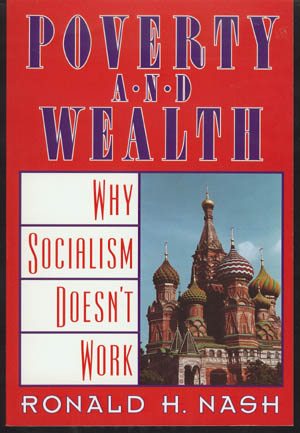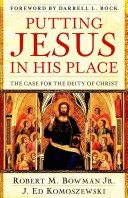Don Closson examines the arguments in Ronald Nash’s book Poverty and Wealth: Why Socialism Doesn’t Work and concludes that capitalism is compatible with biblical ethics.
It’s disheartening to meet young Christians who are convinced of the immorality of capitalism and the free market system. Sincere Christians often quote the second chapter of Acts which describes how the church in Jerusalem held all things in common as proof that socialism or collectivism is more biblical than the free market. Sometimes they use the Marxist critique that “poor nations are poor because rich nations oppress them.” It’s unusual to meet students who wholeheartedly endorses capitalism. They recognize that it works well enough to make the U.S. the richest nation on earth, but it’s not something to be proud of or openly endorse.
 There continues to be a heated debate in our country over which economic system is the most just and best able to weather the inevitable economic ups and downs in today’s complex worldwide economy. Christians wonder if capitalism is inherently incompatible with Christian ethics. Is it driven by greed and self-interest alone? Does it thrive on oppression? Does it conflict with a biblical view of human nature?
There continues to be a heated debate in our country over which economic system is the most just and best able to weather the inevitable economic ups and downs in today’s complex worldwide economy. Christians wonder if capitalism is inherently incompatible with Christian ethics. Is it driven by greed and self-interest alone? Does it thrive on oppression? Does it conflict with a biblical view of human nature?
 Ronald Nash’s book Poverty and Wealth: Why Socialism Doesn’t Work{1} faces these questions head on and concludes that free market capitalism leads to abundance and political freedom because it is based on the laws of economics and the truth about human nature. Social and economic programs that ignore these laws will inevitably cause more harm than good. Even more importantly, Nash argues that capitalism is compatible with biblical ethics. He writes,
Ronald Nash’s book Poverty and Wealth: Why Socialism Doesn’t Work{1} faces these questions head on and concludes that free market capitalism leads to abundance and political freedom because it is based on the laws of economics and the truth about human nature. Social and economic programs that ignore these laws will inevitably cause more harm than good. Even more importantly, Nash argues that capitalism is compatible with biblical ethics. He writes,
Capitalism is quite simply the most moral system, the most effective system, and the most equitable system of economic exchange. When capitalism, the system of free economic exchange, is described fairly, there can be no question that it, rather than socialism or interventionism, comes closer to matching the demands of the Biblical ethic.{2}
In order to understand Dr. Nash’s point we will define some basic economic concepts and compare capitalism with socialism and interventionism. Neither Dr. Nash’s book nor I question the intentions of Christians who have accepted Marxist solutions, but we do question their wisdom. In the words of Dr. Nash,
“Unfortunately, many Christians act as though the only thing that counts is intention. But when good intentions are not wedded to sound theory, especially sound economic theory, good intentions can often result in actions that produce consequences directly opposite to those we planned.”
Even the acceptance of free markets by China and Eastern Europe have not swayed the true believer of Marxist thinking. Our young people will encounter a Marxist critique of capitalism and the free market system at some point in their education. As parents we owe it to our children to have an answer to their certain questions.
The Market System
The market system is the set of rules that creates a voluntary system of exchange resulting in the price, selection, and quantity of products that are made and sold in an economy. Those who support capitalism believe that both parties benefit from the voluntary exchange of goods and services. Marxists, on the other hand, often argue that the free market system results in a win/lose relationship. What are the rules that define a free market system and what role should government play in maintaining it?
The rules of a free market system are simple. First, people should not be coerced into making economic exchanges. This means that they should be free from force, fraud, or theft. Another rule is that people must honor their contracts to buy or sell with another party. Just as local government provides for the traffic signals in a town, government is responsible for enforcing the basic rules of the free market. Traffic signals create order out of potential chaos on our roads. Likewise, the rules of the free market system create order out of potential economic chaos. But in neither case do the rules tell people where to go or what to trade. Both systems are neutral to an individual’s personal goals.
The decentralized actions of producers and consumers encourage the production of a vast array of products at prices that people are willing to pay. These goods and services are produced, not because someone is forced to, but because they know that by satisfying needs they can earn an income and satisfy their own desires. Free market capitalism is based on this principle of mutual accommodation. The market also encourages the efficient use of resources. Price is a factor of demand for a product and the scarcity of its components. It is the market which takes into account an almost infinite number of decisions and variables to make goods available at the best possible price. Profits and losses within the market encourage producers to move into or out of the production of a given item. Inefficient production or over-production of an item will result in losses sufficient enough to change a producer’s behavior.
Government is necessary for enforcing the basic rules of a free market economy. Its interest should be to make sure that justice prevails, and to ensure the common good. This includes the right to own and exchange property, the enforcement of contracts, as well as laws forbidding the use of force, fraud, and theft. If the government itself begins to intervene beyond this role, it becomes a detriment to the market and can itself become the source of injustice. A system based on, or highly influenced, by government coercion cannot be called a free market system.
Capitalism vs. Socialism
A former president of the Evangelical Theological Society has written that capitalism violates “the basic ethical principles of Christianity” and that there is an essential political and economic dimension to the Kingdom of God which capitalism defiles. This thinking has the effect of placing supporters of capitalism among the heretics and against the Kingdom of God. Does capitalism really violate the gospel message and a biblical worldview? Does socialism offer the only righteous means for creating and distributing wealth?
Capitalism argues that individuals have the right to make decisions about what they own. This not only assumes the right to own property, but to exchange what one owns for something else, and to be free from force in the form of fraud, theft, or the violation of a contract. The moral base of “thou shalt not steal” and “thou shalt not lie” are essential to the success of a capitalistic system. In fact, these basic rules of capitalism are very similar to an Old Testament view of righteousness which focused on the completion of covenant agreements. God is considered a righteous God partially because He fulfills His covenants with His creation.
Marxists love to point to examples like the Philippines under Ferdinand Marcos in order to criticize capitalism. This corrupt regime can surely be criticized, but not as an example of capitalism. It is representative of what might be called an interventionist economy. There are three general types of economies: capitalist, interventionist, and socialist. Capitalism and socialism are at the two ends of the continuum with interventionism in the middle. The two opposites represent two possible means of exchange. Capitalism is defined by its advocacy of free or peaceful exchange, allowing individual choice regarding the use of personal property. Socialism is defined by centralized planning, using force to get individuals to conform to its decisions. A system becomes less capitalistic and more interventionist as more and more economic decisions are coerced by the government. It becomes socialistic when basic needs are met only by the government, forcing people to deal with it exclusively. The ideal of capitalism is freedom; the ideal of socialism is forced compliance with government planning.
Critics of capitalism condemn economic systems in which interest groups use the power of government to intervene on their behalf, forcing consumers via taxes or mandates to spend their money or use their talents in a way they would not freely choose. But this isn’t capitalism; it’s interventionism, and unfortunately a pretty good description of where the U.S. is headed.
Economic Systems and Human Nature
Is capitalism the primary cause of world poverty? Although the Bible does teach that exploitation is one cause of poverty, it also teaches that it results from indigence and sloth as well as accidents, injuries, and illness. When the prophet Amos condemned the Jews for forcing the poor to give them grain, for taking bribes, and depriving the oppressed justice, he was highlighting violations of free market capitalism as well.
Some believe that capitalism is built on greed, which the Bible condemns. However, the Bible does teach a certain level of self-interest. For example, 1 Timothy 5:8 is critical of anyone who does not provide for the needs of his family. And although selfishness exists in capitalistic countries, it is not inherent to the system; it is inherent to humanity. Either we allow people to make choices based on their own self-interest and moral virtue, or we turn those decisions over to a central government. Could it be naïve to think that government officials will use wealth in a morally superior way to those outside of government? History teaches that when power is centralized it has the tendency to be abused.
In a non-coercive free market environment, those who serve the needs of others will prosper. As long as the rule of law prevails and the government isn’t allowed to stack the deck for one particular group against another, the market protects us from the greed of others. The free market is by definition one place where coercion is not possible.
Socialists contend that competition is another evil of capitalism, but is competition itself an evil? We can agree that using force, fraud, or theft to compete is morally wrong, but can we really say that all competition is wrong? Scarcity demands competition; as long as resources are limited we will find some competitive means for allocating them. Socialist societies use long waiting lines and bureaucratic red tape to dole out limited goods, and competition is intense for political positions that result in material gain.
There are only two ways to resolve conflict that results from scarcity. One is by force, the other is by free market competition. Non-violent free market competition has helped to alleviate the effects of scarcity by stirring people to high levels of excellence in manufacturing and services. Socialist countries are not usually known for the quantity or quality of their goods and services.
Economist Walter Williams notes that “Capitalism has a strong bias toward serving the common man. . . . Political allocation of resources, regardless of its stated purpose, is strongly biased in favor of the elite.”{3} Maybe that is why the elite have such disdain for capitalism.
Critiquing Socialism
Highly collectivist economies are not known for producing what people need at a price they can afford. In the 1920s, economist Ludwig von Mises showed why central planners can never replace the market: they are unable to gather the necessary information to plan accurately. The market system provides incentives to both producers and buyers that are missing in socialistic countries. Under socialism “rewards are not related to effort and commercial risk-taking, but to party membership, bureaucratic status, political fiat and corruption.”{4} Sociologist Peter Burger writes, “Simply put, Socialist equality is shared poverty by serfs, coupled with the monopolization of both privilege and power by a small (increasingly hereditary) aristocracy.”{5}
One evangelical writer contends that Marxism has “a deep compassion for people. Unlike present political systems—big business, even the Church—it [Marxism] does not seem to have any particular vested interests to defend.”{6} In other words, only Marxists really care about people. However, history has not been kind to Marxist collectivism. Some of the worst human rights records have been accumulated by Marxist regimes in the U.S.S.R., China, Cambodia, North Korea and Cuba. I find it hard to imagine that the millions who died at the hands of Stalin, Mao Tse Tung, or the Khmer Rouge were very impressed by the compassion of their nation’s Marxist leaders.
But what about the example in Acts of all Christians sharing their goods in common or of Barnabas selling his property for the good of other believers? What some people miss is that both of these examples are of individuals making free moral choices to use their property for the good of others. They are making free market decisions regarding their possessions. This can only occur when individuals have the freedom to use their possessions to help others. If all economic decisions are made by centralized planners, moral choice is removed and the option to act upon personal moral convictions is reduced.
Living within a capitalistic society allows believers to exercise their personal responsibility to provide for the poor and less fortunate. This has resulted in remarkable examples of philanthropy in America and other capitalistic nations. In fact, no other people on earth have given as much to other nations as have Americans.
A properly functioning market system is an effective tool against oppression and corruption because it promotes the rule of law for all citizens. However, a strong moral system is necessary to keep it from being controlled by special interests. There are too many examples of economies that have been shaped for the benefit of a few. Christ’s advocacy for the poor should make us a strong moral barrier to this kind of corruption.
Notes
1. Ronald H. Nash, Poverty and Wealth: Why Socialism Doesn’t Work (Dallas: Probe Books, 1986).
2. Ibid., 80.
3. Ibid., 75.
4. Ibid., 87.
5. Ibid.
6 . Andrew Kirk, The Good News of the Kingdom Coming (Downers Grove, IL: InterVarsity Press, 1985), 45, quoted in Nash, Poverty and Wealth, 191.
© 2009 Probe Ministries
 A recent book by Robert Bowman and Ed Komoszewski titled Putting Jesus in His Place is a great confidence builder for those wrestling with this key doctrine. The book offers five lines of evidence with deep roots in the biblical material. The book is organized around the acronym H.A.N.D.S. It argues that the New Testament teaches that Jesus deserves the honors only due to God, He shares the attributes that only God possesses, He is given names that can only be given to God, He performs deeds that only God can perform, and finally, He possesses a seat on the throne of God.
A recent book by Robert Bowman and Ed Komoszewski titled Putting Jesus in His Place is a great confidence builder for those wrestling with this key doctrine. The book offers five lines of evidence with deep roots in the biblical material. The book is organized around the acronym H.A.N.D.S. It argues that the New Testament teaches that Jesus deserves the honors only due to God, He shares the attributes that only God possesses, He is given names that can only be given to God, He performs deeds that only God can perform, and finally, He possesses a seat on the throne of God.
